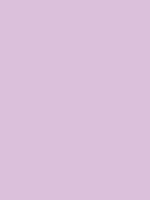#dbc0db Color Information
In a RGB color space, hex #dbc0db is composed of 85.9% red, 75.3% green and 85.9% blue. Whereas in a CMYK color space, it is composed of 0% cyan, 12.3% magenta, 0% yellow and 14.1% black. It has a hue angle of 300 degrees, a saturation of 27.3% and a lightness of 80.6%. #dbc0db color hex could be obtained by blending #ffffff with #b781b7. Closest websafe color is: #cccccc.
-
- R 86
- G 75
- B 86
-
- C 0
- M 12
- Y 0
- K 14
● #dbc0db color description : Light grayish magenta.
#dbc0db Color Conversion
The hexadecimal color #dbc0db has RGB values of R:219, G:192, B:219 and CMYK values of C:0, M:0.12, Y:0, K:0.14. Its decimal value is 14401755.
| Hex triplet | dbc0db | #dbc0db |
|---|---|---|
| RGB Decimal | 219, 192, 219 | rgb(219,192,219) |
| RGB Percent | 85.9, 75.3, 85.9 | rgb(85.9%,75.3%,85.9%) |
| CMYK | 0, 12, 0, 14 | |
| HSL | 300°, 27.3, 80.6 | hsl(300,27.3%,80.6%) |
| HSV (or HSB) | 300°, 12.3, 85.9 | |
| Web Safe | cccccc | #cccccc |
| CIE-LAB | 80.669, 14.251, -9.943 |
|---|---|
| XYZ | 60.847, 57.875, 74.979 |
| xyY | 0.314, 0.299, 57.875 |
| CIE-LCH | 80.669, 17.377, 325.096 |
| CIE-LUV | 80.669, 13.724, -17.762 |
| Hunter-Lab | 76.075, 9.638, -5.183 |
| Binary | 11011011, 11000000, 11011011 |
Color Schemes with #dbc0db
Alternatives to #dbc0db
Below, you can see some colors close to #dbc0db. Having a set of related colors can be useful if you need an inspirational alternative to your original color choice.
#dbc0db Preview
This text has a font color of #dbc0db.
<span style="color:#dbc0db;">Text here</span>This paragraph has a background color of #dbc0db.
<p style="background-color:#dbc0db;">Content here</p>This element has a border color of #dbc0db.
<div style="border:1px solid #dbc0db;">Content here</div>.text {color:#dbc0db;}.background {background-color:#dbc0db;}.border {border:1px solid #dbc0db;}Shades and Tints of #dbc0db
A shade is achieved by adding black to any pure hue, while a tint is created by mixing white to any pure color. In this example, #0c070c is the darkest color, while #fffeff is the lightest one.
-
#0c070c
#0c070crgb(12,7,12) -
#180e18
#180e18rgb(24,14,24) -
#251525
#251525rgb(37,21,37) -
#311c31
#311c31rgb(49,28,49) -
#3e233e
#3e233ergb(62,35,62) -
#4a2a4a
#4a2a4argb(74,42,74) -
#573257
#573257rgb(87,50,87) -
#633963
#633963rgb(99,57,99) -
#704070
#704070rgb(112,64,112) -
#7c477c
#7c477crgb(124,71,124) -
#894e89
#894e89rgb(137,78,137) -
#955595
#955595rgb(149,85,149) -
#a25ca2
#a25ca2rgb(162,92,162)
-
#a969a9
#a969a9rgb(169,105,169) -
#b075b0
#b075b0rgb(176,117,176) -
#b782b7
#b782b7rgb(183,130,183) -
#be8ebe
#be8ebergb(190,142,190) -
#c69bc6
#c69bc6rgb(198,155,198) -
#cda7cd
#cda7cdrgb(205,167,205) -
#d4b4d4
#d4b4d4rgb(212,180,212) -
#dbc0db
#dbc0dbrgb(219,192,219) -
#e2cce2
#e2cce2rgb(226,204,226) -
#e9d9e9
#e9d9e9rgb(233,217,233) -
#f0e5f0
#f0e5f0rgb(240,229,240) -
#f8f2f8
#f8f2f8rgb(248,242,248) -
#fffeff
#fffeffrgb(255,254,255)
Tones of #dbc0db
A tone is produced by adding gray to any pure hue. In this case, #d0cbd0 is the less saturated color, while #fd9efd is the most saturated one.
-
#d0cbd0
#d0cbd0rgb(208,203,208) -
#d3c8d3
#d3c8d3rgb(211,200,211) -
#d7c4d7
#d7c4d7rgb(215,196,215) -
#dbc0db
#dbc0dbrgb(219,192,219) -
#dfbcdf
#dfbcdfrgb(223,188,223) -
#e3b8e3
#e3b8e3rgb(227,184,227) -
#e6b5e6
#e6b5e6rgb(230,181,230) -
#eab1ea
#eab1eargb(234,177,234) -
#eeadee
#eeadeergb(238,173,238) -
#f2a9f2
#f2a9f2rgb(242,169,242) -
#f6a5f6
#f6a5f6rgb(246,165,246) -
#f9a2f9
#f9a2f9rgb(249,162,249) -
#fd9efd
#fd9efdrgb(253,158,253)
Color Blindness Simulator
Below, you can see how #dbc0db is perceived by people affected by a color vision deficiency. This can be useful if you need to ensure your color combinations are accessible to color-blind users.
